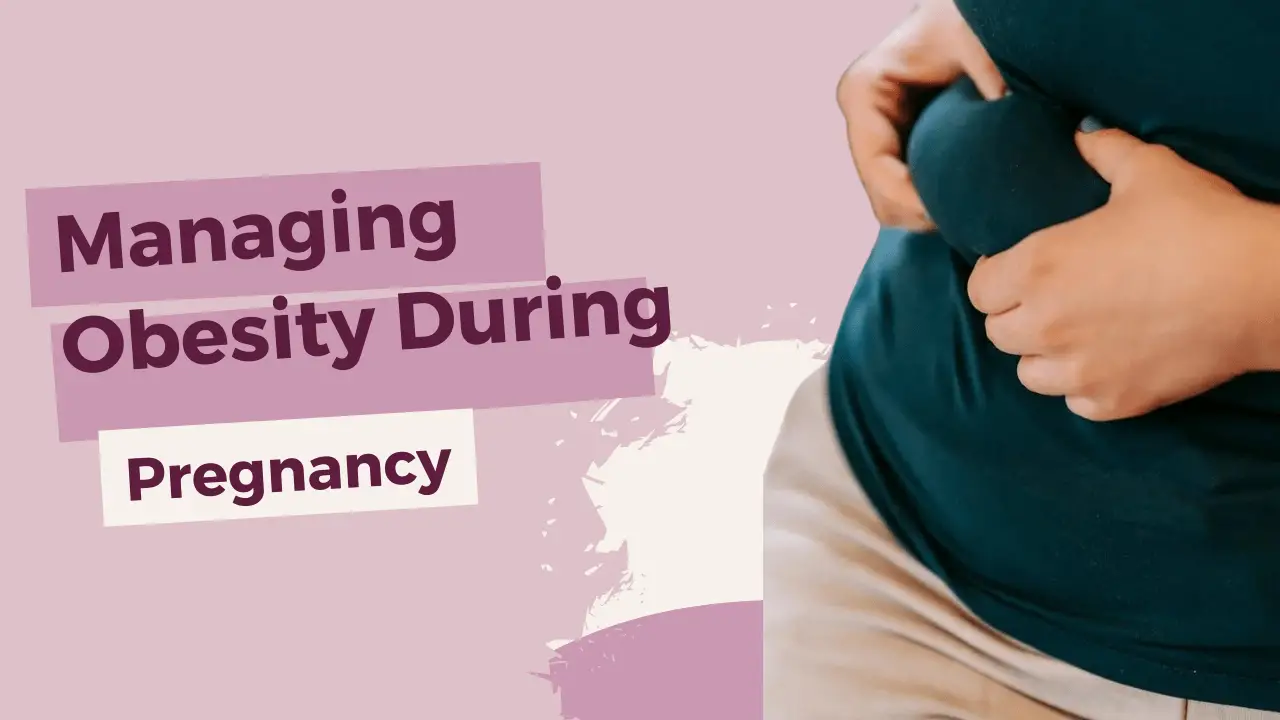For the mother’s and the unborn child’s health and well-being, controlling obesity during pregnancy is essential. Pregnancy-related obesity increases the chance of cesarean birth, gestational diabetes, and preeclampsia, among other issues.
Additionally, it may have an effect on the health of the child, increasing the risk of preterm birth, birth abnormalities, and childhood obesity. Pregnant women must therefore prioritize keeping a healthy weight with a balanced diet, frequent exercise, and close medical supervision.
By addressing obesity during pregnancy, mothers can significantly improve their own health outcomes and give their babies a healthier start in life.
Importance of Professional Guidance:
When it comes to managing obesity during pregnancy, professional guidance is essential to ensure the health and safety of both the mother and the baby. Healthcare providers, including obstetricians, nutritionists, and fitness experts, play a critical role in offering personalized care and advice tailored to the unique needs of pregnant women dealing with obesity.
These professionals help create a comprehensive plan that addresses diet, exercise, and medical monitoring, ensuring that both mother and baby receive optimal care.
Role of Healthcare Providers in Managing Obesity During Pregnancy
Healthcare providers are indispensable in managing obesity during pregnancy. Obstetricians monitor the pregnancy closely, tracking weight gain, blood pressure, and glucose levels to identify any potential complications early on.

They provide recommendations on safe weight gain targets and suggest dietary adjustments to ensure the mother and baby receive essential nutrients without excessive calorie intake. Nutritionists create individualized meal plans that prioritize meals high in nutrients and low in calories, with an emphasis on nutrient-dense foods.
They help expectant moms maintain a balanced diet by providing helpful guidance on portion control and healthy eating practices. Pregnant women are guided by fitness professionals through safe and efficient workout regimens.
They advise engaging in physical activity that strengthens muscles, promotes cardiovascular health, and improves general well-being without placing an excessive amount of strain on the body. Under medical supervision, regular physical activity can greatly help manage obesity during pregnancy.
Nutritional Strategies:
Effective nutritional strategies are paramount in managing obesity during pregnancy. Adopting key dietary changes, focusing on nutrient-dense foods, and avoiding high-calorie, low-nutrient foods can significantly impact the health and well-being of both the mother and the baby.
Key Dietary Changes for Managing Obesity During Pregnancy
Managing obesity during pregnancy requires thoughtful dietary adjustments. Eating a balanced diet full of whole grains, lean meats, healthy fats, and a range of fruits and vegetables is crucial.
These foods provide essential vitamins and minerals necessary for the baby’s development and the mother’s health. Reducing the intake of processed and sugary foods is crucial to prevent excessive weight gain. Portion control and mindful eating are also important practices that help manage calorie intake without compromising nutrition.
Importance of Nutrient-Dense Foods
Nutrient-dense foods are vital for managing obesity during pregnancy. These meals are perfect for maintaining a healthy pregnancy because they are high in vital nutrients and low in calories. Foods high in vitamins, minerals, and antioxidants that support fetal growth and mother health include leafy greens, berries, nuts, seeds, lean meats, and legumes.
By including a range of these meals, you can make sure both mom and baby get the nourishment they require without gaining extra weight.
Avoiding High-Calorie, Low-Nutrient Foods
High-calorie, low-nutrient foods can contribute to excessive weight gain and are detrimental when managing obesity during pregnancy. These meals have minimal nutritional value and can cause problems like gestational diabetes and hypertension since they are frequently high in sugars, bad fats, and processed carbohydrates.

Sugar-filled beverages, fast food, and snacks are a few examples. Limiting these foods helps maintain a healthy weight and reduces the risk of pregnancy-related complications.
In summary, establishing effective nutritional measures is vital for managing obesity during pregnancy. By making critical dietary modifications, focusing on nutrient-dense meals, and avoiding high-calorie, low-nutrient options, pregnant moms can support their health and the health of their babies, ensuring a safer and better pregnancy.
Exercise Recommendations:
Regular exercise is a key component in managing obesity during pregnancy. Engaging in safe and effective physical activities, incorporating exercise into daily routines, and understanding the importance of staying active can greatly benefit both the mother and the baby.
Safe and Effective Exercises for Pregnant Women
When managing obesity during pregnancy, it’s crucial to choose exercises that are safe and effective. Strength training with light weights or resistance bands can also be beneficial, but it’s important to avoid high-impact or strenuous exercises that could pose a risk to the mother or baby.
Consulting with a healthcare provider before beginning any exercise regimen ensures that the activities are appropriate for the individual’s health status and pregnancy stage. Low-impact activities like walking, swimming, and prenatal yoga are highly recommended.

These exercises help improve cardiovascular health, enhance muscle tone, and boost overall well-being without putting undue stress on the body.
Incorporating Physical Activity into Daily Routines
Incorporating physical activity into daily routines is essential for managing obesity during pregnancy. Simple changes such as taking the stairs instead of the elevator, parking further from the entrance, or engaging in household chores can add up to significant physical activity throughout the day.
Scheduling short, frequent exercise sessions can make it easier to stay active without feeling overwhelmed. For instance, a 10-minute walk after each meal can improve digestion and contribute to overall physical fitness.
Creating a routine that blends physical activity with daily tasks ensures consistent movement and helps maintain a healthy weight.
Importance of Staying Active While Managing Obesity During Pregnancy
Staying active is crucial for managing obesity during pregnancy. Regular exercise helps regulate weight gain, improves mood, enhances sleep quality, and reduces the risk of gestational diabetes and hypertension. It also prepares the body for labor and delivery by strengthening muscles and increasing endurance.
Moreover, physical activity can alleviate common pregnancy discomforts such as back pain and swelling. By prioritizing regular exercise, expectant mothers can better manage their weight and promote a healthier pregnancy experience.
Monitoring and Tracking Progress:
Monitoring and tracking progress are essential components in managing obesity during pregnancy. Utilizing tools to track weight and health indicators, understanding healthy weight gain targets, and committing to regular check-ups and adjustments to care plans can help ensure a healthier pregnancy for both mother and baby.
Tools for Tracking Weight and Health Indicators
In managing obesity during pregnancy, having the right tools to monitor progress is crucial. Digital scales, mobile health apps, and wearable fitness trackers can help expectant mothers keep an accurate record of their weight and physical activity.
Health apps often come with features to log food intake, track exercise routines, and monitor vital signs such as blood pressure and heart rate. Keeping a detailed record allows mothers to see their progress over time and make informed decisions about their health. Regularly updating these records helps in identifying patterns and addressing any concerns promptly.
Understanding Healthy Weight Gain Targets
Understanding healthy weight gain targets is a critical aspect of managing obesity during pregnancy. Weight gain recommendations vary based on pre-pregnancy weight and body mass index (BMI). Healthcare providers offer personalized guidance on the appropriate amount of weight to gain throughout the pregnancy.
For women with obesity, the recommended weight gain is usually less than for women with a normal BMI. Gaining weight within the recommended range helps reduce the risk of complications such as gestational diabetes, preeclampsia, and preterm birth. Knowing these targets enables expectant mothers to set realistic goals and stay on track with their health plans.
Regular Check-ups and Adjustments to Care Plans
Regular check-ups are vital for managing obesity during pregnancy. Regular check-ups with the doctor enable careful monitoring of the mother’s and infant’s health. Doctors are able to evaluate weight gain, blood pressure, glucose levels, and other vital health markers during these examinations.
These evaluations enable medical professionals to make the required changes to the treatment plan, such as adding more medical interventions, changing the recommended food, or tweaking the exercise schedule. Regular monitoring guarantees that any possible problems are dealt with early on and that the treatment plan is applicable and efficient for the duration of the pregnancy.
Mental and Emotional Health:
Addressing mental and emotional health is a crucial aspect of managing obesity during pregnancy. Managing stress and anxiety, seeking mental health support, and employing strategies for emotional well-being can significantly enhance the overall pregnancy experience for expectant mothers.
Managing Stress and Anxiety Related to Obesity and Pregnancy
Pregnancy, especially when managing obesity, can bring about significant stress and anxiety. An expecting mother may feel a great deal of pressure from society, probable problems, and worries about the baby’s health. Anxiety and stress can have a detrimental effect on one’s physical and mental well-being, which may have detrimental effects on the mother and child.
These emotions can be controlled with the aid of methods like deep breathing exercises, mindfulness meditation, and pregnancy yoga. Pregnant women should make time for leisure and enjoyable hobbies because these pursuits can help them decompress and lower their stress levels.
Importance of Mental Health Support
Mental health support is vital for managing obesity during pregnancy. Regular consultations with mental health professionals, such as therapists or counselors, can provide a safe space to discuss fears and anxieties. These professionals can offer coping strategies and emotional support tailored to the individual’s needs.
Support groups for pregnant women, whether in person or online, can also be beneficial. Sharing experiences with others facing similar challenges can reduce feelings of isolation and provide a sense of community and understanding.
Strategies for Emotional Well-Being
Managing obesity during pregnancy requires putting emotional well-being techniques into practice. Emotional ups and downs can be managed by keeping an optimistic attitude and having reasonable expectations.
Regular exercise releases endorphins, which have been shown to improve mood and energy levels. Positive effects on mental health can also be obtained from a well-balanced diet high in vital nutrients.
Creating a solid network of family and friends to lean on offers emotional security and support. A daily self-care routine that includes activities like reading, taking a bath, or engaging in a hobby can also significantly improve emotional well-being.
Conclusion:
In conclusion, managing obesity during pregnancy is crucial for ensuring the health and well-being of both the mother and the baby. By focusing on stress management, seeking mental health support, and implementing strategies for emotional well-being, expectant mothers can navigate the challenges of obesity during pregnancy more effectively.
Prioritizing mental and emotional health alongside physical health helps create a balanced and healthy pregnancy experience, leading to better outcomes for both mother and child. Click to learn more.
FAQs:
What are the risks of obesity during pregnancy?
Obesity during pregnancy can increase the risk of gestational diabetes, preeclampsia, and complications during delivery. It may also affect the baby’s health, potentially leading to preterm birth or birth defects.
How can I manage my weight during pregnancy?
Focus on a balanced diet rich in nutrients, engage in safe physical activities, and attend regular prenatal check-ups to monitor weight and health indicators.
What types of exercise are safe during pregnancy?
Low-impact exercises such as walking, swimming, and prenatal yoga are generally safe. Always consult your healthcare provider before starting any new exercise routine.
Why is mental health important when managing obesity during pregnancy?
Managing stress and anxiety is crucial as these can negatively impact both physical health and weight management. Mental health support can help maintain emotional well-being and a healthier pregnancy.
How can I track my progress effectively?
Use tools like digital scales, health apps, and wearable trackers to monitor weight and health indicators. Regular check-ups with your healthcare provider will also help track progress and adjust care plans as needed.
